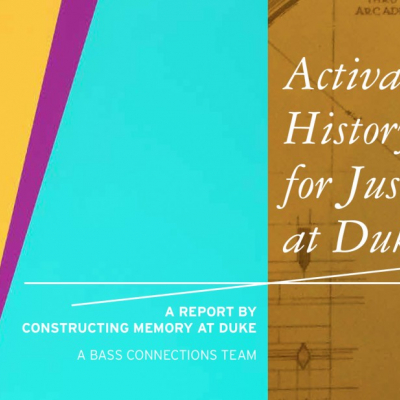
Activating History for Justice at Duke is a digital report analyzing current memory sites on Duke's campus, and making recommendations for additional sites to showcase a more inclusive and diverse perspective on Duke's history. Students started the Duke-specific phase of the project by digitally mapping the campus, to show where and how Duke physically tells its story. To help make the case that important stories have gone undervalued or untold, they assembled a Story Bank drawn from the University Archives to show some of the key figures and moments that should be recognized at Duke. The Story Bank reflects the views of the students and their desire, more focused with each week of the project, to lift up forebears and honor the pathways they carved and that brought these students to Duke. Among those featured in the Story Bank are "firsts," including women, African Americans and Native Americans; and examples of principled leadership, including among the students, faculty and staff who led the Silent Vigil, Student Action with Farmworkers and the Anti-Sweat Shop campaign. We hope the Story Bank is a resource as the Duke community moves forward. Students also designed site proposals, based on parts of history they felt needed to be commemorated or emphasized. New sites would help reshape the campus into a place that more accurately honors the rich contributions made by many people, inspire current and future students to see themselves in this space and encourage all to strive to uphold our shared values.
See more at http://www.activatinghistoryatduke.com/.
People Involved With The Project
- Robin Kirk, Faculty Co-Chair of the Duke Human Rights Center and Lecturer in the Department of Cultural Anthropology (Primary Investigator)